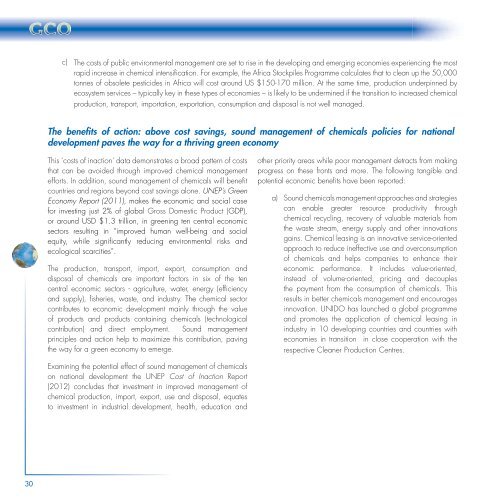Global Chemicals Outlook - UNEP
Global Chemicals Outlook - UNEP
Global Chemicals Outlook - UNEP
Create successful ePaper yourself
Turn your PDF publications into a flip-book with our unique Google optimized e-Paper software.
30<br />
c) The costs of public environmental management are set to rise in the developing and emerging economies experiencing the most<br />
rapid increase in chemical intensifi cation. For example, the Africa Stockpiles Programme calculates that to clean up the 50,000<br />
tonnes of obsolete pesticides in Africa will cost around US $150-170 million. At the same time, production underpinned by<br />
ecosystem services – typically key in these types of economies – is likely to be undermined if the transition to increased chemical<br />
production, transport, importation, exportation, consumption and disposal is not well managed.<br />
The benefi ts of action: above cost savings, sound management of chemicals policies for national<br />
development paves the way for a thriving green economy<br />
This ‘costs of inaction’ data demonstrates a broad pattern of costs<br />
that can be avoided through improved chemical management<br />
efforts. In addition, sound management of chemicals will benefi t<br />
countries and regions beyond cost savings alone. <strong>UNEP</strong>’s Green<br />
Economy Report (2011), makes the economic and social case<br />
for investing just 2% of global Gross Domestic Product (GDP),<br />
or around USD $1.3 trillion, in greening ten central economic<br />
sectors resulting in “improved human well-being and social<br />
equity, while signifi cantly reducing environmental risks and<br />
ecological scarcities”.<br />
The production, transport, import, export, consumption and<br />
disposal of chemicals are important factors in six of the ten<br />
central economic sectors - agriculture, water, energy (effi ciency<br />
and supply), fi sheries, waste, and industry. The chemical sector<br />
contributes to economic development mainly through the value<br />
of products and products containing chemicals (technological<br />
contribution) and direct employment. Sound management<br />
principles and action help to maximize this contribution, paving<br />
the way for a green economy to emerge.<br />
Examining the potential effect of sound management of chemicals<br />
on national development the <strong>UNEP</strong> Cost of Inaction Report<br />
(2012) concludes that investment in improved management of<br />
chemical production, import, export, use and disposal, equates<br />
to investment in industrial development, health, education and<br />
other priority areas while poor management detracts from making<br />
progress on these fronts and more. The following tangible and<br />
potential economic benefi ts have been reported:<br />
a) Sound chemicals management approaches and strategies<br />
can enable greater resource productivity through<br />
chemical recycling, recovery of valuable materials from<br />
the waste stream, energy supply and other innovations<br />
gains. Chemical leasing is an innovative service-oriented<br />
approach to reduce ineffective use and overconsumption<br />
of chemicals and helps companies to enhance their<br />
economic performance. It includes value-oriented,<br />
instead of volume-oriented, pricing and decouples<br />
the payment from the consumption of chemicals. This<br />
results in better chemicals management and encourages<br />
innovation. UNIDO has launched a global programme<br />
and promotes the application of chemical leasing in<br />
industry in 10 developing countries and countries with<br />
economies in transition in close cooperation with the<br />
respective Cleaner Production Centres.

















